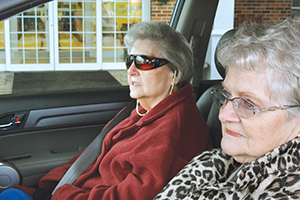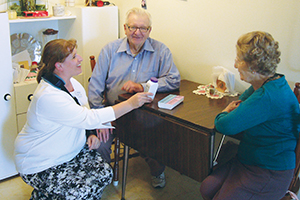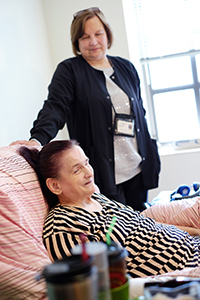Isolation can take physical, mental toll on seniors
By JULIE MINDA
At age 85, Beverly Hill of Danville, Ill., refuses to let her near-blindness stand in the way of the independence she craves. Living at home alone since her husband's death 22 years ago, and experiencing increasing blindness due to Stargardt disease, she does her own cooking and laundry. Every third Thursday of the month, she lunches with a group that calls themselves the "Friends for Lunch Bunch," and she regularly visits with friends she made through support groups she created decades ago for people with sight limitations.

Jean Brady, at right, provides transportation and other help for Beverly Hill, a senior who lives in Danville, Ill. Brady volunteers through Presence Health's Faith in Action program.
Hill has outlived her two children, and as for her grandchildren and great-grandchildren, she doesn't want to involve them in her care because "I would run the family crazy." She wants to continue to live in her home; she knows she needs support to do so.
She credits much of her ability to have an active, engaged lifestyle to Faith in Action, a volunteer network established by Presence Health's Vermilion County, Ill., and Champaign County, Ill., facilities to meet the spiritual, physical and emotional needs of homebound seniors and their caregivers. Those volunteers helped retrofit Hill's home to accommodate her blindness; and they drive Hill and others where they need to go.
Presence is among the many ministry providers that have developed programs and services for a growing population of elderly adults who are trying to live independently and safely at home despite health and mobility problems. Using volunteers, parish nurses and networking with community and government groups, ministry providers help address elders' needs for transportation, food, light home maintenance, care coordination and, perhaps most importantly, contact with the "outside world."
Cut off
Ashton Greer, a program coordinator with Faith in Action, said, "Seniors often live alone, isolated and without assistance. The physical struggle is hard, but emotionally and mentally there is struggle as well. Seniors often are without family, or have a family that is busy and unable to meet their needs, and life becomes too challenging and overwhelming."

Nurse Michele Thorpe, at left, visits August and Tillie Wiederrich — ages 92 and 99, respectively — in their Ellendale, N.D., apartment as part of Thorpe's role as a parish nurse to the homebound elderly. Thorpe also is director of nursing for Prince of Peace Care Center in Ellendale.
With the growing population of over-65 Baby Boomers, and with increasing life expectancy in the U.S., millions of people are becoming homebound and needing home-based care, according to "Physical and Mental Health of the Homebound Elderly: An Overlooked Population," an article in the December 2010 Journal of the American Geriatrics Society. At the time of publication, psychiatrist and scientist Dr. Wei Qiao Qui and her co-authors cited an estimate that up to 3.6 million Americans were homebound and in need of home-based care. This population is of concern to health care providers because "the homebound elderly suffer from physical and psychiatric illnesses at a much higher rate than non-homebound elders," according to the authors.
Michele Thorpe is director of nursing for Benedictine Health System's Prince of Peace Care Center of Ellendale, N.D., and a parish nurse for the elderly. She said, particularly in rural areas, the loss of the ability to drive means those seniors no longer can easily access almost anything they need, from groceries to pharmaceuticals. They also cannot get to medical appointments conveniently. Unaddressed health needs can impact their health status and quality of life.
Downward spiral
And, very often, in addition to physical deterioration, there are mental health issues. Thorpe said many of the seniors she visits feel anxiety and fear because they are approaching death. Depression and dementia are common among the homebound elderly. The American Geriatrics article estimates that about 29 percent of the homebound population have a form of dementia. It is estimated that up to 17 percent have an undiagnosed cognitive impairment.

Nurse Marcia Pott visits Chicagoan Terry Regan in her home. Pott visits Regan and her husband, both of whom are blind and homebound, through Presence Health's Homebound Elderly Program.
Linda Tauber-Olson, Presence regional director of Faith in Action, said homebound elderly, especially those who have outlived spouses, other family members and friends, often feel lonely, and they question their purpose in life. They don't want to be a burden, and many "hide in their homes — they don't want to be seen," she said.
Annie Holowatyj, volunteer supervisor for the Presence Health Homebound Elderly Program, which serves clients throughout the Chicago metropolitan area, said the combination of physical and cognitive limitations and emotional pain can "lead to a downward spiral effect on health." Rosann Prosser, director of clinical operations for Presence Home Care, which is affiliated with the Presence Homebound Elderly Program, said isolation can lead to depression, and then to noncompliance with doctors' orders and medical problems that require hospitalization.
Closed door
Many seniors suffer these concerns stoically. Presence's Greer said, "It's difficult to ask for help when you've been able to help yourself for most of your life, and so I think the greatest struggle for senior service programs is to not only meet the physical, mental and emotional needs, but to help the individual understand that they can't do it alone anymore, and that it's nothing to be ashamed of."
Holowatyj of Presence said even those seniors willing to ask for help may be wary of talking to neighbors they don't know, for fear of being taken advantage of.
Nancy Burton, development and marketing director of Benedictine Health Center at Innsbruck in New Brighton, Minn., added that many neighbors now don't really know one another — and don't watch out for each other as they may have in the past.
Bevin Page, a Presence Faith in Action coordinator, said that another issue is that "our society has changed in how we see seniors. Years ago, people had more respect and regards for seniors but now it is the opposite."
A maze
Prosser said those who do ask for help often develop a patchwork of informal support — perhaps made up of family members, neighbors or landlords. But often these good Samaritans do not fully understand the elders' needs, or cannot meet all the needs adequately. Family members and other loved ones may be too remote geographically or too busy with their fast-paced lives to provide reliable support.
Joan Jakuboski is a nurse and director of EldersFirst, a private pay consulting service for seniors offered by the Diocesan Health Facilities eldercare organization in Fall River, Mass. Jakuboski said that while there are resources available to meet seniors' needs — Medicare and Medicaid cover certain medical and therapy services delivered to the home; federal and state aid programs cover some nutrition and other basic needs; churches and community organizations often provide assistance — they're only accessed through a very complex and fragmented system. She said for elders and caregivers attempting to find services, it can feel like they are lost in a maze. EldersFirst helps people navigate that maze.
Someone cares
Each ministry provider who spoke to Catholic Health World has developed a different way to help frail elderly in their communities. All have found success by putting loving, caring people on their doorsteps to help them.
The Presence Health Homebound Elderly Program team has found that their homebound elderly program clients, with an average age of 87, are healthier than peers not in the program, said Prosser. That program offers a combination of "friendly visitors" and clinician visits for the homebound. Research shows as compared with peers, the severity of their diagnosis is less, they are not in the hospital as long and their readmission rate is lower in part because they have had clinicians and volunteers connecting with them. This is according to Prosser, who said the key is the oversight by those visiting their home. These visitors can detect signs and symptoms of problems earlier, which allows intervention at a lower acuity level and correction with the use of fewer health care resources, she said.
Tauber-Olson said Faith in Action has heard from its senior clients that the visiting volunteers made them feel valued. One client said the volunteers "make me feel like I am still important to life."
All concurred that the most important aspect of their outreach is the relationships formed between the seniors and those assisting them.
"You need to know someone cares," said Hill, the Danville senior.
| Ministry providers use different approaches to reach homebound elders Each of the providers who spoke to Catholic Health World about their experiences serving the homebound elderly uses a different approach to reach this vulnerable population: - EldersFirst The Diocesan Health Facilities long-term care organization in Fall River, Mass., has been offering elders and their families this geriatric health care consulting service for about 15 years. The program's two nurse coordinators — a third will be hired soon — assist seniors in navigating the health care and social support system. The nurses help clients to live safely in their homes; they help them set up medical appointments and accompany them to the appointments; they act as an advocate in medical matters; they assist clients in managing their prescriptions correctly; they refer them to wrap-around services; they advise them on decisions about transitioning to a skilled nursing facility. Elders or their families pay an hourly rate for the service. Diocesan Health Facilities charges below cost for the service, according to one of its EldersFirst nurse coordinators, Joan Jakuboski.
- Faith in Action To meet the needs of homebound elderly in Champaign County, Ill., and Vermillion County, Ill., Presence Health taps into a network of volunteers from area congregations and community organizations. Those volunteers provide live and telephone check-in visits and transportation. They also do home repairs, rake leaves, help with household chores and connect the senior with financial assistance. The program began with a grant from the Robert Wood Johnson Foundation. It relies on volunteer donations, church sponsorships, fund-raising and additional grants.
- Parish Health and Wellness Model Benedictine Health Center at Innsbruck in New Brighton, Minn., partners with St. John the Baptist Catholic church in New Brighton, to reach the parish's frail elderly parishioners in their homes. A parish nurse or trained volunteers from the church visit the homebound, provide them with information on — or referrals to — a variety of medical and social support services. Through the five-year-old program, the volunteers also can do light housekeeping, prepare food, serve communion, cut hair or help with taxes. The program also provides education and support to caregivers of homebound adults.
- Parish Nurse Program A nurse and nurse coordinator from Prince of Peace Care Center in Ellendale, N.D., visit the frail homebound, assess their needs and then point them toward medical providers or others who can meet those needs. The program began with a grant but now is funded mostly by churches, private donors and funds from Benedictine Health System, which owns Prince of Peace. The nurse and nurse coordinator aim to ensure each elder's emotional, medical, prescription, transportation, nutrition and practical living needs are met.
- Presence Health Homebound Elderly Program Operating primarily in the Chicago area, Presence Health's program connects the homebound elderly with nurses, social workers, volunteers and local agencies — particularly area agencies on aging — to meet the elders' physical, mental and social needs. The visiting team members assist the elders in managing their health conditions and ensure they get the wrap-around services they need. Providers connected to the program said the initiative has been successful because of the close collaboration of senior aid provider organizations.
|
| Homebound elderly experience gap in services Medicare generally will cover some home health services, including nursing care, physical therapy, speech-language pathology services, occupational therapy and other medical services on a limited basis, and usually just when a doctor prescribes that therapy for a specific duration of time.
Long-term care coordination and in-home services generally are not covered when they are not connected with a specific acute medical episode for which the patient is receiving care. Also, according to the Medicare website, Medicare does not cover custodial care, which that government agency defines as non-skilled personal care. This includes assistance with the activities of daily living.
|
Copyright © 2014 by the Catholic Health Association
of the United States
For reprint permission, contact Betty Crosby
or call (314) 253-3477.